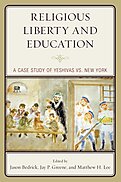Religious Liberty and Education: A Case Study of Yeshivas vs. New York
(Rowman and Littlefield, 2020)
Join the conversation on X using #CatoCOVID. Follow @CatoInstitute on X to get future event updates, live streams, and videos from the Cato Institute.
Additional Resources

This work is licensed under a Creative Commons Attribution-NonCommercial-ShareAlike 4.0 International License.
